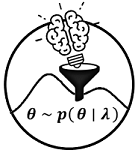elicit.simulations module#
- class elicit.simulations.Priors(ground_truth, init_matrix_slice, trainer, parameters, network, expert, seed)[source]#
Bases:
ModuleInitializes the hyperparameters of the prior distributions.
- Attributes:
- ground_truthbool
whether samples are drawn from a true prior (‘oracle’)
- global_dictdict
dictionary containing all user and default input settings
- loggerlogging method
retrieves module name for passing it to the logger
- init_priorsdict
initialized hyperparameters (i.e., trainable variables); None if ground_truth = True
Initializes the hyperparameters (i.e., trainable variables)
- Parameters:
- ground_truthbool
whether samples are drawn from a true prior (‘oracle’)
- global_dictdict
dictionary containing all user and default input settings.
- __init__(ground_truth, init_matrix_slice, trainer, parameters, network, expert, seed)[source]#
Initializes the hyperparameters (i.e., trainable variables)
- Parameters:
- ground_truthbool
whether samples are drawn from a true prior (‘oracle’)
- global_dictdict
dictionary containing all user and default input settings.
- elicit.simulations.intialize_priors(init_matrix_slice, method, seed, parameters, network)[source]#
Initialize prior distributions.
- Parameters:
- global_dictdict
dictionary including all user-and default input settings.
- Returns:
- init_priordict
returns initialized prior distributions ready for sampling.
- elicit.simulations.sample_from_priors(initialized_priors, ground_truth, num_samples, B, seed, method, parameters, network, expert)[source]#
Samples from initialized prior distributions.
- Parameters:
- initialized_priorsdict
initialized prior distributions ready for sampling.
- ground_truthbool
whether simulations are based on ground truth (then sampling is performed from true distribution).
- global_dictdict
dictionary including all user-input settings..
- Returns:
- prior_samplesdict
Samples from prior distributions.
- elicit.simulations.softmax_gumbel_trick(epred: float, likelihood: callable, upper_thres: float, temp: float, seed: int)[source]#
The softmax-gumbel trick computes a continuous approximation of ypred from a discrete likelihood and thus allows for the computation of gradients for discrete random variables.
Currently this approach is only implemented for models without upper boundary (e.g., Poisson model).
Corresponding literature:
- Maddison, C. J., Mnih, A. & Teh, Y. W. The concrete distribution:
A continuous relaxation of
discrete random variables in International Conference on Learning Representations (2017). https://doi.org/10.48550/arXiv.1611.00712
Jang, E., Gu, S. & Poole, B. Categorical reparameterization with
gumbel-softmax in International Conference on Learning Representations (2017). https://openreview.net/forum?id=rkE3y85ee. - Joo, W., Kim, D., Shin, S. & Moon, I.-C. Generalized gumbel-softmax gradient estimator for generic discrete random variables.
Preprint at https://doi.org/10.48550/arXiv.2003.01847 (2020).
- Parameters:
- model_simulationsdict
dictionary containing all simulated output variables from the generative model.
- global_dictdict
dictionary including all user-input settings.
- Returns:
- ypredtf.Tensor
continuously approximated ypred from the discrete likelihood.
- elicit.simulations.simulate_from_generator(prior_samples, seed, model)[source]#
Simulates data from the specified generative model.
- Parameters:
- prior_samplesdict
samples from prior distributions.
- global_dictdict
dictionary including all user-input settings.
- Returns:
- model_simulationsdict
simulated data from generative model.

